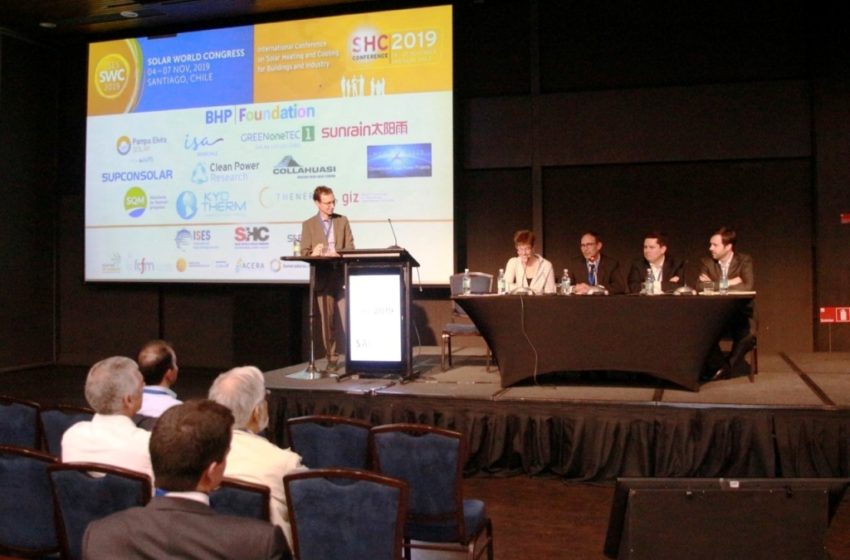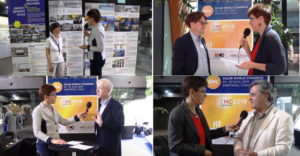Solar heat cost-competitive with fossil fuels if used in large projects
December 4, 2019
The organisers of the joint SHC/SWC 2019 conferences, which took place in November in Santiago, Chile, introduced a new session format, when they held three Research meets Business Forums. The third one on Wednesday, Deployment of Solar Thermal Solutions for Industrial Process Heating and Cooling, was moderated by Andreas Häberle (left), Director of Swiss-based SPF – Institute for Solar Technology and co-chair of Solar Process Heat, a new international research platform set up by the IEA Solar Heating and Cooling programme. The objective of this session was to detail the challenges of implementing projects for industrial customers and demonstrate how researchers can support the deployment of SHIP systems around the world. SHIP stands for Solar Heat for Industrial Processes.
Photo: IEA SHC / Randy Martin
“We offer heat supply contracts, so we retain ownership of the SHIP technology. This makes it much easier to optimise and operate systems. But it is still super challenging to convince mining companies to sign these sorts of contracts,” Ian Nelson (third from right), Managing Director of Chilean-based supplier Energía Llaima, said at the start of the discussion. Since 2013, his company has owned and operated a 30 MW solar heat plant at a mine in the middle of the desert in northern Chile. Rodrigo Mancilla (second from right), Managing Director of Santiago-based start-up business Thenergy, which specialises in industrial solar heat solutions, underlined that “it will be absolutely necessary to lower the capital expenditure on solar thermal technology, but this depends heavily on contract values.”
And the key message of Christian Pichard, Regional Manager for Latin America at Glasspoint, based in the United States, was: “We deliver solar heat at lower costs than fossil fuels.” Glasspoint has already signed contracts for building multi-gigawatt SHIP plants. Its technology is fairly unique because it puts parabolic troughs into greenhouses, a low-cost, commonly available product built on thousands of acres every year. The greenhouse-protected collectors weigh a tenth of standard parabolic troughs, which brings down the cost of solar heat to below that of fossil fuels if the technology is used in large projects.
Carbon taxes and GHG emissions reduction targets increase demand for SHIP
The industry representatives agreed that a carbon tax on fossil fuels could make a big difference as to how managers in the industrial sector view solar heat and the fixed prices it offers. Nelson also called for setting renewable targets in the industrial heat market. Implementing this sort of regulatory policy could be an important measure to alleviate the concerns of industrial clients. “We have to map out targets for each industrial sector within national GHG emissions reduction plans,” he suggested. Pichard warned that if the carbon tax on fossil fuel used in large industrial heat boilers were equal to the tax for fuel-driven electric generating units, electricity prices could see a hefty increase, so that national stakeholders would become less accepting of renewable technology.
When asked how researchers could support SHIP businesses, the panellists had several suggestions, for example:
- Put up storage tanks to supply heat around the clock
- Optimise the process of removing soil from collectors
- Increase the productivity of solar fields
“We should work together to spread the message that solar heat is a proven and reliable source of thermal energy and can be cost-competitive if used in large projects,” Pichard said in his concluding statement. Still, joint and comprehensive marketing efforts will be needed to get the message out to industrial end customers.
Organisations mentioned in this article:


